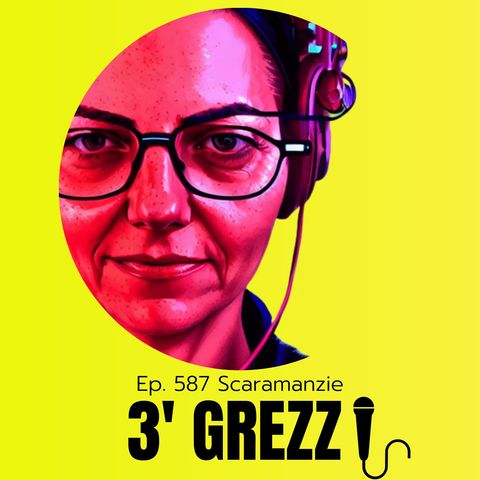3' grezzi Ep. 587 Scaramanzie

Descarga y escucha en cualquier lugar
Descarga tus episodios favoritos y disfrútalos, ¡dondequiera que estés! Regístrate o inicia sesión ahora para acceder a la escucha sin conexión.
3' grezzi Ep. 587 Scaramanzie
Descripción
Le superstizioni hanno un loro perché. E a dirlo non sono io ma la scienza. TRASCRIZIONE [ENG translation below] Quando qualcuno mi chiede se sono religiosa, io rispondo no, e...
mostra másTRASCRIZIONE [ENG translation below]
Quando qualcuno mi chiede se sono religiosa, io rispondo no, e di solito, aggiungo non sono religiosa ma sono superstiziosa. In effetti questo non è nemmeno troppo corretto, perché dovrei più giustamente dire: non sono religiosa, sono scaramantica, nel senso che ho le mie idiosincrasie, ho le mie cose scaramantiche, appunto, che mi accompagnano, mi tengono compagnia e non è che siano per me una religione, però diciamo che ci faccio attenzione, a quello che dico, a quello che faccio.
Sì, allora voi vi direte ma come Cristina, tu sei una persona che di solito appare piuttosto razionale, come mai sei scaramantica e credi queste cose? Mi sono informata. Allora, in effetti le superstizioni e le scaramanterie, si dice così? In effetti hanno un loro perché, infatti funzionano, come funzionano? Naturalmente la superstizione, la scaramanteria non funziona se dico, ah ecco, gioco sempre gli stessi numeri al lotto, perché altrimenti se gioco numeri diversi poi escono. Quando dipendono dal caso le cose scaramantiche non funzionano. Fate quello che vi pare, mettete i calzini rossi, viola, mettete il cappello al contrario, mettetevi la maglietta portafortuna: non funziona per vincere al Totocalcio, né per indovinare i numeri al lotto.
Quand'è però che funziona, effettivamente hanno fatto degli studi, non me lo sto inventando, credetemi. Funziona effettivamente quando dobbiamo noi performare, quando dobbiamo fare qualcosa, quando dobbiamo compiere uno sforzo, quando dobbiamo impegnarci, chessò, durante una gara sportiva o durante un esame scritto, orale, di qualsiasi tipo.
Perché funzionano? Perché se io sono convinta che il ciondolino sia il mio portafortuna, cosa succede? Che se me lo metto sul tavolo mentre sto facendo l'esame, il semplice fatto di averlo lì mi rassicura. E voi sapete bene che quando una persona è tranquilla, quando i livelli di ansia scendono, di solito la performance migliora, quindi reagiamo in modo più disinvolto e in modo più tranquillo e contemporaneamente se io sono convinta che il ciondolino mi porti fortuna, l'averlo dimenticato a casa mi predisporrà in modo così negativo, diventerò così ansiosa, diventerò così nervosa che sicuramente i miei neuroni ne risentiranno, quindi non mi sentirò a mio agio, sarà nervosa e automaticamente andr peggio all'esame.
Ergo, avere il ciondolino portafortuna mi aiuta indirettamente a andare meglio all'esame e il non averlo mi costringe indirettamente a credere che sia il ciondolino e non la mia mente a portare fortuna o sfortuna. Capito?
TRANSLATION
When someone asks me if I am religious, I say no, and usually, I add I am not religious but I am superstitious. In fact, this is not even too correct, because I should more rightly say: I am not religious, I believe in the propitiatory, in the sense that I have my idiosyncrasies, I have my propitiatorythings, precisely, that accompany me, keep me company and it is not that they are a religion for me, however, let's say that I pay attention to it, to what I say, to what I do.
Yes, so you will say to yourselves but how come Cristina, you are a person who usually appears quite rational, how come you are superstitious and believe these things? I looked into it. So, actually superstitions and scaramanteries, is that what they say? In fact they have their own reason to exist, in fact they work, how do they work? Of course superstition, superstition doesn't work if I say, ah here, I always play the same numbers in the lottery, because otherwise if I play different numbers then they come out. When it depends on chance, superstitious do not work. Do whatever you like, put on red, purple socks, put your hat on backwards, put on your lucky shirt: it doesn't work for winning the Football Pool, nor for guessing numbers in the lottery.
However, when it works, actually they have done studies, I am not making it up, believe me. It actually works when we have to perform, when we have to do something, when we have to make an effort, when we have to engage, say, during a sports competition or during a written, oral test of any kind.
Why do they work? Because if I am convinced that the pendant is my good luck charm, what happens? That if I put it on the table while I'm taking the test, just having it there reassures me. And you know very well that when a person is calm, when anxiety levels go down, usually performance improves, so we react more casually and in a calmer way, and at the same time if I am convinced that the pendant brings me good luck, having forgotten it at home will predispose me in such a negative way, I will become so anxious, I will become so nervous that certainly my neurons will be affected, so I will not feel comfortable, I will be nervous and automatically I will do worse in the exam.
Ergo, having the good-luck charm indirectly helps me do better on the test, and not having it indirectly forces me to believe that it is the charm and not my mind that brings good luck or bad luck. Got it?
Información
| Autor | M. Cristina Marras |
| Organización | M. Cristina Marras |
| Página web | - |
| Etiquetas |
Copyright 2024 - Spreaker Inc. an iHeartMedia Company

Comentarios